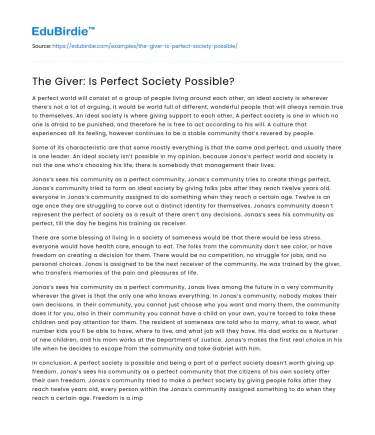Introduction
In Lois Lowry's novel, "The Giver," readers are transported to a seemingly perfect society where pain and suffering have been eradicated, and uniformity is the norm. This society, however, prompts a fundamental question: Is a perfect society truly attainable, or is it merely an illusion that sacrifices essential human values? The concept of a utopia has been a subject of philosophical and literary exploration for centuries, with thinkers like Plato and Thomas More envisioning ideal societies. Yet, these visions often reveal inherent contradictions when scrutinized in practice. The Giver's community, devoid of emotional depth and individual freedom, raises ethical and existential dilemmas that challenge the very notion of perfection. This essay will explore the complexities of creating a perfect society by analyzing the societal structures in "The Giver," examining real-world parallels, and considering philosophical arguments about human nature and freedom.
The Illusion of Perfection in "The Giver"
In "The Giver," the community's claim to perfection is predicated on the absence of conflict, inequality, and suffering. These goals are achieved through the meticulous control of every aspect of life, from climate to career assignments, ensuring homogeneity and predictability. However, this control comes at a significant cost: the suppression of individuality and emotional depth. The community's inability to experience genuine emotions, such as love, joy, or grief, highlights the paradox of their utopian existence. As Jonas, the protagonist, begins to receive memories of the past, he realizes that the price of this so-called perfection is the loss of essential human experiences. As philosopher John Stuart Mill argued, the suppression of individuality is a fundamental flaw that undermines human potential and happiness (Mill, 1859).
Save your time!
We can take care of your essay
- Proper editing and formatting
- Free revision, title page, and bibliography
- Flexible prices and money-back guarantee
The novel's depiction of a society stripped of choice and emotion serves as a cautionary tale about the dangers of valuing uniformity over diversity. The community's emphasis on sameness eliminates the complexities and richness of human life, creating a sterile environment devoid of creativity and innovation. This mirrors real-world attempts at creating utopian societies, such as the Soviet Union's experiment with communism, which often resulted in oppression and disillusionment. These historical examples underscore the inherent difficulties in achieving a perfect society when the mechanisms of control necessitate the erosion of personal freedoms and emotional expression.
Real-World Parallels and Philosophical Critiques
The quest for a perfect society is not limited to fiction, as evidenced by historical and contemporary efforts to engineer ideal communities. The 20th century witnessed numerous social experiments aimed at creating utopian societies, from communal living projects to authoritarian regimes. These attempts often revealed the tension between collective ideals and individual rights. For instance, the Israeli kibbutzim sought to create egalitarian communities based on shared responsibilities and resources. While initially successful, many kibbutzim struggled with issues of personal autonomy and economic sustainability, leading to significant reforms over time (Spiro, 2004).
Philosophically, the idea of a perfect society raises questions about human nature and the value of freedom. Thomas Hobbes posited that humans are inherently self-interested, requiring strong governance to maintain order (Hobbes, 1651). In contrast, Jean-Jacques Rousseau argued that humans are naturally good but corrupted by society (Rousseau, 1762). These differing views highlight the complexity of designing a society that balances order and freedom. "The Giver" illustrates this tension by presenting a society that sacrifices freedom for order, ultimately questioning whether true perfection is possible without compromising fundamental human values.
The Role of Freedom and Individuality
Central to the debate about perfect societies is the role of freedom and individuality. "The Giver" demonstrates that a lack of personal freedom leads to a superficial form of perfection that is ultimately unsatisfying. The community's rigid adherence to conformity suppresses creativity and the human spirit, essential components of a fulfilling life. As Jonas experiences the breadth of human emotions and memories, he comes to value the complexity and unpredictability that accompany individual freedom.
Real-world examples further illustrate this point. Democratic societies, despite their imperfections, allow for a diversity of thought and expression that fosters innovation and personal fulfillment. Conversely, totalitarian regimes often stifle these qualities in pursuit of a unified vision, resulting in societal stagnation and unrest. The philosophical perspective of existentialists like Jean-Paul Sartre emphasizes the importance of individual freedom and the responsibility that comes with it (Sartre, 1946). Such perspectives suggest that the pursuit of a perfect society must consider the intrinsic value of human freedom and individuality, recognizing that imperfection is a natural and necessary aspect of life.
Conclusion
In conclusion, "The Giver" serves as a poignant exploration of the complexities and contradictions inherent in the pursuit of a perfect society. By examining the sacrifices made in the name of uniformity and control, the novel raises important questions about the nature of perfection and the value of individuality and freedom. Historical and philosophical perspectives further illuminate the challenges of creating a utopia, suggesting that the quest for perfection may be futile if it requires the suppression of fundamental human qualities. Ultimately, the novel and real-world examples indicate that a truly perfect society may be less about achieving uniformity and more about embracing diversity and the richness of the human experience. As we continue to grapple with these issues, "The Giver" reminds us of the importance of balancing order with freedom, and the enduring value of individuality in our quest for a better world.






 Stuck on your essay?
Stuck on your essay?

